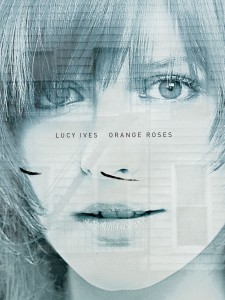Book Review
Lucy Ives does not tell us how to find meaning in our lives, but she demonstrates its constant loss and rediscovery in her new poetry and essay collection, Orange Roses. Leaf through quickly, and it appears to be composed of interestingly disparate pieces that simply needed a home. It is anything but that. Here, there are koan-like short verses, nominal sonnets, prose poems, lists, confessions, travelogues that read like flash fiction, and even a poem not listed in the contents like one of those bonus tracks artists used to hide at the ends of cassette tapes. They are linked by their search for meaning, which is never where it is sought, yet can only be found in the searching. The key to the ideal reading is in the first lines of the first piece, “The Poem”: “The fallacy of the poem is beautiful because it is already the / embodiment of a reader, presaging the eventual arrival of a realizing eye:”—the reader always collaborates with the poem, of course, but is rarely reminded so explicitly to do so.
Next, “In Sonnets,” in five parts of fourteen lines, searches for meaning in separation. Prior to its discovery is a desire to rewind:
Try saying Lure
My former I am waiting
That you change back
One fool hopes you
Soften
Failing that, an insight:
This is to tell you my new home
How right here becomes
A thing you could have seen
This new understanding of moving through loss becomes the relationship’s value, as “Everyone’s life must be / Rarified some way.”
The reader will benefit from reading “Early Poem” aloud. Certain questions arise—how are the sentence numbers significant, where did the eighteenth sentence go (only the most intrepid reader will glean this information), and how long can this be sustained? Those questions may distract, but that is part of the fun and a good portion of the point; between comedic episodes that include the army of ancient Rome, a one-eyed duck doodle, and crabs on Cleopatra’s Needle in Central Park, discoveries are made, such as: “In the thirteenth sentence I realize I have chosen something.” Soon, the speaker nears the meat of it:
I sit down beside myself in the thirty-fourth sentence and say to myself, smiling, even small numbers are big. This is the working of time, the thirty-fifth sentence joins in saying this, too, once one has crossed the years their number does not matter. But what I was trying to get across was, I think in sentence thirty-six, that maybe you could not have done things earlier, maybe it just was not possible in those days for whichever reasons.
Less distractible now, more focused, the speaker begins periodically to address someone specific. By sentence sixty-six, the suspicion arises that “counting…goes on and means itself without having a meaning.” But all this counting, the reason for which the speaker all but dares us to calculate, is forgotten by sentence ninety-three where an intimate quiet falls: “Now I am speaking to you.” The last effort to keep count occurs in sentence ninety-six when the speaker states: “What it means to live is the subject.” Then the numbers stop. The final sentence, one hundred, marks the point of so much loss (and potential gain) that it even lacks a period, the devastating effect of which is magnified by the poem’s flippant beginning.
Such misdirection is no magician’s trick. It is as though Ives acts in the capacity of a Montessori teacher, allowing the reader to explore exactly what happens to all of us, over and over, our whole lives. As the title poem “Orange Roses” puts it:
Quality of time. One wishes to assign qualities to it, but then these are the qualities assigned; planned and not discovered. Why should the unexpected be
of such value, when we are trying to sense not it but rather that in or against which it occurs?
Like finding a mislaid hundred-dollar bill while searching for a quarter, the unexpected is vastly richer than the planned; hence, the initial poem’s desire for that unknown quality of the reader’s collaboration is understandable. Sometimes all is asked is commiseration, as in “On Imitation”: “On weekends sometimes I lay on the floor of my room and pondered the perfection of everyone’s actions. ‘Everyone is acting so natural,’ I thought. ‘Everyone knows just what to do.’” The speaker is a college student in the late 1990s, but anyone past the age of twelve can relate. Sometimes the reader must fill in a huge blank: “Movies were natural. The higher their budgets, the more natural they appeared.” By now, that feels reasonable. We can see the “nasty sentimentality” of Titanic, “epitomized by Kate Winslet’s crimped orange hair” even if we liked it, perhaps especially then.
Near the end of “On Imitation,” we are confronted once more with meaning’s loss. In her search for a natural writing method, the speaker hits on a plan: “I had decided that I was going to search for the most dumb writing, the most image-like. I hoped it would be so much more natural.” She does the logical thing and travels along the California coast, taking notes, and turns around when she gets to Crescent City. Of course, none of that writing survived. What, then, was discovered? That remains satisfyingly unclear. The reader discovers one final poem, unlisted in the table of contents, fittingly unexpected. It is poignant and, like the other pieces in this collection, unlike anything else in it. Rather than supplying answers to the reader’s unanswered questions it serves quite neatly to replace them. Its perfect title? “I Don’t Know.”
About the Reviewer
Holly Bilski lives and writes in Sacramento.
